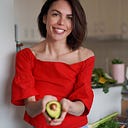Which Foods Should a Mother Eat
Because skipping meals and raw salads are never an option in the fourth trimester
In many cultures, a postpartum mama is taken care of, to support the healing process and the bonding with the baby. The mother is normally asked to rest, nourish herself and avoid strenuous tasks for at least a month post birth.
Fast forward to our westernized and fast-paced society, that bonding and nourishing time is deemed superfluous. A postnatal mama is normally asked to showcase her brand new baby to many social events, is demanded to resume work within a short period of time, and is frowned upon when she is not capable to silence her crying bub.
This is where modern diseases such as postnatal anxiety, undernourishment, depletion and simple lack of joy have a fertile space to brew.
Fortunately, there are still things that a modern post-partum mama can do to take care of herself and her bub, such as following a sound nutritional plan focused on healing, restoration of the body while supporting an abundant milk production.
Some of the things that a new mum and her partner need to keep in mind is that:
1- Pregnancy is extremely taxing on the body, and a new mother needs to be replenished.
2- Giving birth is traumatic for the body, and lots of healing needs to take place before a mother can go on with her life.
3- Lactating can be compared to running on a daily basis; it requires lots of extra calories and fluid and is extremely tiring (on top of nerve-wracking at stages).
Furthermore, the microbiome of a postpartum mama has been completely altered, the hormonal roller coaster can lead to inflammation and the changes in serotonin and dopamine levels can lead to mental discomfort, anxiety, and even depression.
Keeping this in mind, it is important to support our body, and soul as much as we can in order to avoid serious issues down the line.
Eat warm and easy to digest foods
As already mentioned, the gut of a new mum is a very delicate garden that needs to be weeded and fed the right way. Especially for the first few days, it is important to opt for warm foods that are nourishing, satisfying and easy to digest. They will allow the body to keep warm, heal and rest without having to spend energy on the digestive system.
Go for the anti-inflammatory foods
After giving birth, and after 9 months of pregnancy diet, nausea, vomiting, reflux, it’s quite normal to want to go to town with fun foods such as pastries, alcohol, deli meats, French cheeses and so on. There will be time for that, but right now it is important to keep the inflammation at bay, in order to support the gut-brain axis and to avoid the interference with the healing of a postnatal body.
Always chose nutrient dense foods
Nutrient dense, zinc and collagen-rich foods are needed for tissue repair, while essential fatty acids and antioxidants are demanded to regulate the hormones and strengthen the immune system. Whenever you feel like eating or having a snack, pack your plate with goodness and ask yourself “Are these foods going to give me energy and are they going to serve my body?”. Sometimes it is enough to make some simple swaps; for example, instead of enjoying a cheese sandwich with mayo on white bread, go for brown seeded bread (or buckwheat bread if you want to be super adventurous), hummus, avocado, and cheese. In less than a minute, you have increased your nutrients intake by a zillion percent.
Filtered water
I can’t underline enough the importance of drinking the right amount of fresh, unfiltered water. If it’s winter time and you are not feeling particularly thirsty, make yourself a soothing cup of fennel and fenugreek or ginger tea. Or even a yummy decaf chai with cinnamon. Delicious!
Water is needed by every single cell of our body, and it’s required in a copious amount for the production of breast milk. Have at least 10 cups of water per day, and you will instantly feel less fatigued, and with more brain energy.
At the same time, steer away from too much caffeine (it is dehydrating and it does also interfere with the cortisol production), and alcohol, as it passes through the breastmilk. If you are really dying for a glass of white, check my blog post on the 4 foods to avoid while breastfeeding.
Which kind of foods should you go for?
• Soups, porridge, kitchari, congees
• Fresh, organic vegetables such as sweet potatoes, carrots, leafy greens, etc (for the first few months, keep the cruciferous vegetables at a minimum)
• Fresh, organic fruit (if available, otherwise frozen berries are great)
• High-quality protein and iron-rich foods such as eggs, tahini, hummus, and bone broth
• Wild caught fish like sardines and salmon (avoid tuna)
• Healthy fats like avocado, EVOO, ghee and coconut oil.
• Nutrient-rich grains such as buckwheat, amaranth, quinoa, millet and
• Calcium and probiotic-rich foods such as yogurt and fermented vegetables to assist the gut microbiome.
• Herbal teas and spices such as fenugreek, fennel, and ginger.
